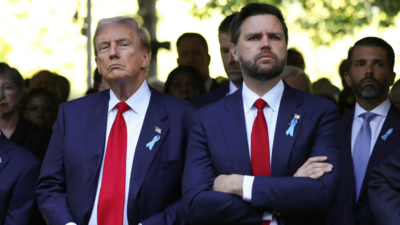US President Donald Trump on Monday decline to anoint vice president as his political successor in the Republican Party and said that it is too early for such an endorsement.
In an interview taped ahead of Super Bowl, a Fox News journalist asked Trump, “Do you view Vice President JD Vance as your successor, the Republican nominee in 2028?
“No, but he’s very capable. I think you have a lot of very capable people, So far I think he’s doing a fantastic job. It’s too early. We’re just starting,” Trump replied.
“By the time we get to get to the midterms,” Baier interjected, “[Vance] is going to be looking for an endorsement. A lot of people have said that this has been the greatest opening — almost three weeks — in the history of the presidency,” he added.
This comes after Trump has frequently expressed his intentions of running for the third term in White House. He has also talked about bringing constitutional amendments to serve a third term.
The 22nd Amendment to the Constitution bars anyone from being elected president “more than twice,” and Trump has already been elected twice, first in 2016 and again in 2024.
Meanwhile, Vance is seen as a front-runner for the next GOP primary contest, USA Today reported.
Pressed about his 2028 plans within the first days of the returning Trump administration, Vance replied, “We’ll see what happens come 2028.”
According to a recent survey of GOP voters found if the primary were held now, Vance would be the top choice to take the presidential nomination with 27% of those polled saying they would back the former Ohio senator.
Vance stepped onto the world stage for the first time as US vice president this week, using a high-profile artificial intelligence summit in France and a gathering of national security leaders in Germany to showcase Donald Trump’s more assertive approach to diplomacy.
The 40-year-old vice president, who was just 18 months into his tenure as a senator before joining Trump’s ticket, is expected, while in Paris, to push back on European efforts to tighten AI oversight while advocating for a more open, innovation-driven approach.







